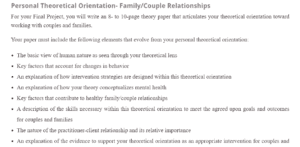Personal Theoretical Orientation- Family/Couple Relationships
The Basic View of Human Nature
Carl Rogers was a humanistic psychologist. He asserted that a person needed an environment conducive to positive ‘growth.’ The environment he referred to provided a person with acceptance, genuineness, and empathy. A person needs to be allowed opportunities for self-disclosure and openness, being understood and listened to, and being perceived with outright positive regard. Rogers asserted that when these were not present, the development of healthy personalities and relationships was impossible. Further, he noted that a person achieves self-actualization when life desires, wishes, and goals are achieved (Ismail & Tekke, 2015).
Humans, according to Rogers, have the basic goal of self-actualization, which can happen when the environment is conducive to achieving the same. People have an inner inclination to be creative and also to be good. These inherent qualities are corrupted only when external constraints or poor self-perception override the value process. A person can only achieve self-actualization from the point of congruence; the ideal self needs to be congruent with the self-image. Childhood experience determines whether one will become a fully functioning, self-actualized person.
Therapeutic interventions provide a context where a person can overcome incongruent distortions. These distortions are a person’s functioning condition of worth and need to be overridden by the realization of actualizing, maintaining, and enhancing the positive self-image. Rogers describes this as “the psychological conditions which are both necessary and sufficient to bring about constructive personality change” (Rogers, 1957, p. 95). These conditions are: a) psychological contact occurs between two persons; b) the first is the client who is anxious and vulnerable and in an incongruent state; c) the second is the congruent therapist; d) the therapist has positive regard, which is also unconditional, toward the client; e) the therapist is empathetic and communicates the same to the client; f) the client receives the empathetic communication.
References
Ismail, N. A. H., & Tekke, M. (2015). Rediscovering Rogers’s self-theory and personality. Journal of Educational, Health and Community Psychology, 4(3), 28-36.
Rogers, C.R. (1957) The necessary and sufficient conditions of personality change. Journal of Consulting Psychology, 21: 95–103.
ORDER A PLAGIARISM-FREE PAPER HERE
We’ll write everything from scratch
Question
Personal Theoretical Orientation- Family/Couple Relationships
For your Final Project, you will write an 8- to 10-page theory paper that articulates your theoretical orientation toward working with couples and families.
Your paper must include the following elements that evolve from your personal theoretical orientation:

Personal Theoretical Orientation- Family/Couple Relationships
- The basic view of human nature as seen through your theoretical lens
- Key factors that account for changes in behavior
- An explanation of how intervention strategies are designed within this theoretical orientation
- An explanation of how your theory conceptualizes mental health
- Key factors that contribute to healthy family/couple relationships
- A description of the skills necessary within this theoretical orientation to meet the agreed-upon goals and outcomes for couples and families
- The nature of the practitioner-client relationship and its relative importance
- An explanation of the evidence to support your theoretical orientation as an appropriate intervention for couples and families in need.

